Exploring the Intricacies of the Nervous System
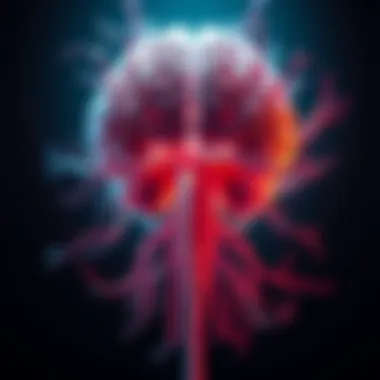
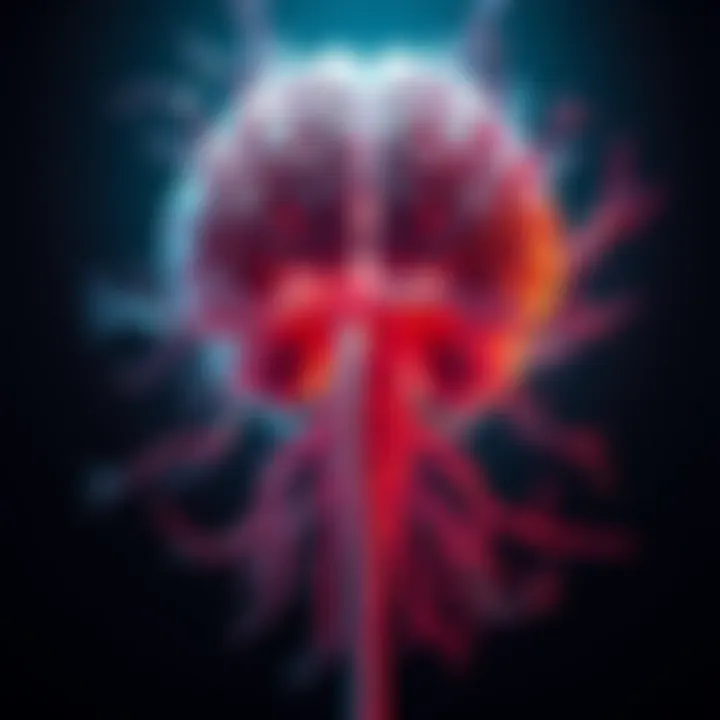
Intro
Navigating the intricacies of the nervous system can feel akin to traversing a maze filled with twists, turns, and unnerving pathways. This complex network of cells and fibers is not just the framework of our physical structure but also a crucial player in shaping who we are—our thoughts, emotions, and behaviors. From the moment you wake up to the point your head hits the pillow at night, the nervous system is hard at work. It enables you to react to stimuli, fosters communication within the body, and hangs onto memories that define experiences.
As you dive into this exploration of the nervous system, prepare to uncover layers of significance and importance that echo in everyday life. The fundamental components, such as the central and peripheral systems, will take center stage. We will also shine a light on how these interconnected pathways not only keep the body functioning but deeply influence mental health and overall well-being.
The implications of nervous system health stretch wide, affecting everything from mood regulation to cognitive abilities, all the way to the sense of balance we seek in life. So, whether you're a curious mind looking to educate yourself or someone keen on the intricacies of human biology, this comprehensive guide will provide the insights and understanding necessary for a clearer view of the nervous system's role in our lives.
Prologue to the Nervous System
The nervous system is a multifunctional network that plays a crucial role in governing not only how an organism responds to its external environment but also how it processes information internally. It serves as the main communication conduit within the body, impacting everything from motor skills to cognitive functions. Understanding the mechanics of this system is paramount for anyone interested in human health, behavior, and mental wellness.
The nervous system's significance cannot be overstated. It regulates bodily functions such as movement, sensation, and even emotional responses. In essence, it orchestrates a symphony of signals that keep our body in harmony with its surroundings.
Definition and Importance
At its most basic, the nervous system comprises two primary components: the central nervous system (CNS) and the peripheral nervous system (PNS). The CNS consists of the brain and spinal cord, functioning as the control center, while the PNS extends out to every part of the body, transmitting messages back and forth. This intricate web of connections enables not merely the execution of physical tasks but also complex cognitive activities such as reasoning and decision-making.
Consider, for a moment, how our senses rely on this system. The sudden sound of a honking car engages both the auditory nerves and cognitive processes, prompting an immediate physical response — whether it’s stepping back or moving out of the way. Herein lies the importance of the nervous system: its interconnected structure allows for rapid responses to stimuli, ensuring survival and adaptability.
Moreover, mental health is closely intertwined with the nervous system. Stress and trauma can have profound effects on its functioning, altering how an individual experiences emotions or even processes thoughts. This relationship underlines the importance of maintaining a healthy nervous system to support overall well-being.
Historical Perspectives
The study of the nervous system has evolved significantly over the centuries. Ancient cultures had their own understanding of how the brain and nerves functioned, often attributing mystical qualities to them. The Greeks, for instance, believed the heart was the source of thought and emotion, with philosophers like Aristotle writing extensively on the subject.
However, it wasn't until the Renaissance that significant advancements were made. Figures like Andreas Vesalius began to dissect human bodies, laying the groundwork for modern anatomy. The invention of the microscope in the 17th century further propelled our understanding, allowing scientists like Thomas Willis to explore the brain's role in regulating bodily functions.
In the 19th century, the delineation of neuronal pathways became clearer, largely thanks to the works of the likes of Ramón y Cajal, who is often referred to as the father of neuroscience. Today's understanding of the nervous system is built upon centuries of inquiry, intuitive leaps, and rigorous experimentation.
"The brain is wider than the sky, For, put them side by side, The one the other will contain With ease, and you beside." — Emily Dickinson
In sum, the nervous system remains a subject rich in both complexity and history. Gaining insight into this elegant system not only broadens our understanding of human physiology but also equips us with the tools we need to navigate both our mental and physical health.
Overview of Nervous System Structure
Understanding the structure of the nervous system lays the foundation for comprehending how it operates. The intricate network of nerves and cells forms a complex communication system that is vital for regulating bodily functions, responding to stimuli, and managing behaviors. When we delve into this structure, we find two primary components: the Central Nervous System (CNS) and the Peripheral Nervous System (PNS). Each has unique roles and characteristics that contribute significantly to the overall functionality of the nervous system.
Central Nervous System
The Central Nervous System consists of the brain and spinal cord. It is where most processing takes place, interpreting signals sent from the various parts of the body.
Brain Anatomy
The brain, an extraordinary organ, is often seen as the control center for the body. Its structure can seem almost labyrinthine at first glance, with billions of neurons creating a mesh of connections. The cerebral cortex, for instance, is vital for functions such as perception, thought, and voluntary movement.
One key characteristic of the brain is its plasticity, the ability to adapt and change in response to experiences. This adaptability is why studying brain anatomy is an appealing aspect of understanding the nervous system. It serves a beneficial role by providing insights into how we learn and form memories, and importantly, how interventions can lead to recovery after injuries or developmental challenges.
A unique feature of the brain is the blood-brain barrier, protecting against harmful substances while allowing essential nutrients to flow. However, this barrier can also be a disadvantage when it comes to delivering medications for certain neurological conditions, posing a challenge in treatment strategies.
Spinal Cord Structure
The spinal cord acts as a major conduit for information traveling to and from the brain. It contains both gray matter, which houses nerve cell bodies, and white matter, which consists of myelinated axons that facilitate rapid transmission of signals.
An essential aspect of spinal cord structure is its role in reflex action. For example, when you touch something hot, the signal travels to the spinal cord and triggers an immediate response before the brain is involved. This characteristic makes the spinal cord a crucial component of the nervous system, serving as a firewall that helps protect the body by acting quickly to potential threats.
Additionally, the arrangement of nerves in the spinal cord is segmented, with each segment corresponding to specific body parts. This segmentation benefits understanding injuries and their effects, guiding rehabilitation strategies.
Peripheral Nervous System


Outside of the brain and spinal cord lies the Peripheral Nervous System, responsible for connecting the CNS to the limbs and organs. It is divided into two main subsystems: the somatic and autonomic nervous systems.
Somatic Nervous System
The Somatic Nervous System governs voluntary movements, allowing us to control our skeletal muscles. It’s responsible for activities from picking up a cup to running a marathon, making it quite significant in everyday life.
A key feature of this system is its capacity for sensory feedback. The sensory receptors in our skin, muscles, and joints send information back to the CNS, informing it about the body's position and state. This positive feedback loop enables coordination and balance, thus enhancing physical performance.
However, one disadvantage might be its susceptibility to fatigue under constant strain, potentially leading to injuries or discomfort.
Autonomic Nervous System
In contrast, the Autonomic Nervous System manages involuntary functions such as heartbeat, digestion, and respiratory rate. It operates without conscious effort, making it a vital aspect of our daily lives.
The unique feature here is its subdivision into sympathetic and parasympathetic systems. The sympathetic system prepares the body for stressful situations—often referred to as the 'fight or flight' response, while the parasympathetic system promotes a state of calm and rest. This balance is crucial for maintaining homeostasis.
Nevertheless, if imbalanced—say, if the sympathetic system is constantly overstimulated—this can lead to anxiety, stress-related disorders, or other health issues.
Understanding these structures and their functions is essential not only for appreciating the body’s mechanics but also for recognizing how disruptions in these systems can lead to health challenges. The nervous system's complexity reflects its importance in our overall well-being and underscores the need for maintaining its health through thoughtful lifestyle choices and therapeutic approaches.
To explore more about the nervous system, check resources at Wikipedia or Britannica.
Links on mental health can be found on platforms like GoodTherapy and various academic sources like PubMed.
Functionality of the Nervous System
The functionality of the nervous system is the driving force behind everything we perceive, experience, and respond to in our daily lives. This intricate network not only helps to transmit signals but also plays a crucial role in maintaining overall well-being. Understanding how this system operates unlocks pathways to improved health and mental clarity. Thus, delving into the functionality of this biological marvel is indispensable for anyone interested in optimizing mental health and wellness.
Nerve Impulses and Signal Transmission
Action Potentials
Action potentials are fundamental for nerve signal transmission, representing a rapid rise and fall of the electrical potential across a neuron's membrane. This characteristic makes them extremely effective at communicating within the nervous system. In simple terms, when a neuron becomes sufficiently stimulated, it creates an action potential that travels along its axon toward other neurons, effectively relaying information.
One key feature of action potentials is that they are all-or-nothing events—this means they either happen fully or not at all, enabling precise signal transmission. This unique aspect ensures that the signal can reach its target accurately without any degradation, which is vital for coordinated bodily responses. However, it’s also important to consider that the rapid firing can lead to fatigue in high-demand situations, making understanding them crucial for applications in medical or sports science.
Synaptic Transmission
Synaptic transmission refers to the process by which a neuron communicates with another neuron through a synapse. It’s a complex dance of chemical messengers called neurotransmitters, which cross the synaptic gap to deliver signals. The key aspect of synaptic transmission is its versatility. This allows for a range of responses—from subtle adjustments in behavior to dramatic shifts in mood.
A notable characteristic is the plasticity of synaptic connections—the more a particular neuron communicates with another, the stronger that connection becomes over time. This regard for improvement is vital for learning and memory processes. However, not all neurotransmitters work the same way; some can negatively impact mood if imbalanced, as seen in various mental health issues. Thus, understanding synaptic transmission is essential for anyone interested in navigating the complexities of emotions and cognitive functioning.
Response Mechanisms
Reflex Actions
Reflex actions exemplify the body's innate ability to respond to stimuli with astonishing speed. This process is largely automatic and requires minimal involvement from the brain, which is what makes reflexes so effective; think of the classic knee-jerk response. This characteristic allows for rapid reactions to potential threats—an invaluable quality from an evolutionary standpoint.
The uniqueness of reflex actions lies in their unconscious nature, making them a fundamental aspect of our nervous system's functionality. One disadvantage, though, is that while reflexes are exceptionally fast, they might not allow for nuanced responses, which can sometimes lead to unintended consequences in complex situations. Nonetheless, these biological shortcuts are lifesavers in many scenarios.
Voluntary Movements
Voluntary movements are a striking demonstration of the nervous system's versatility. Unlike reflex actions, these movements are conscious and deliberate, allowing for intricate control over our bodies. This aspect enables humans to perform activities ranging from playing instruments to intricate surgical procedures, underlining the sophistication of our brain and its pathways.
A key characteristic of voluntary movements is that they are goal-directed; every movement typically aims at achieving a specific outcome. While this is beneficial for skill development, it also means that any inhibition via injury or disorder can dramatically impact quality of life. Hence, understanding these mechanics is vital, particularly for rehabilitation therapies in both physical and mental health contexts.
In summary, the functionality of the nervous system is fundamental for both basic survival and complex behaviors. Through mechanisms such as action potentials, synaptic transmission, reflex actions, and voluntary movements, it shapes not just bodily functions but also elements within our behavioral spectrum. Understanding this functionality is crucial for individuals seeking to prioritize their mental health and overall wellness.
Nervous System and Mental Health
The interplay between the nervous system and mental health is a topic that garners significant attention, reflecting the intricate linkages between how our physical body operates and our mental landscape. The nervous system is not just a communicator of physical sensations; it is also instrumental in shaping our thoughts, emotions, and behaviors. Recognizing these connections can empower individuals to take proactive steps in prioritizing their mental well-being.
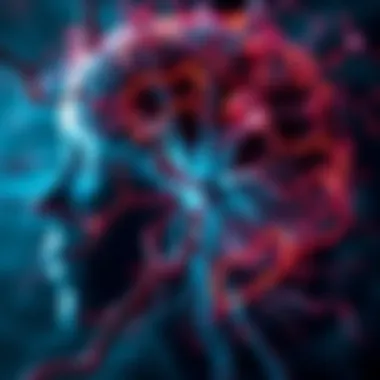

Influence on Behavior and Cognition
Cognitive Functioning
Cognitive functioning encompasses a variety of mental processes including memory, attention, and decision-making. It serves as a cornerstone for an individual’s overall mental capacity, influencing choices and reactions in day-to-day life. Aspects of cognitive functioning can predict how well a person navigates challenges, assesses risks, and evaluates information critically.
A key characteristic of cognitive functioning is its dynamic nature; it can be cultivated or diminished based on experiences and environmental factors. This makes understanding cognitive functioning particularly relevant in this article. For instance, research suggests that engaging in regular mental exercises, such as puzzles or reading, can enhance cognitive abilities, fostering better problem-solving skills in stressful situations. However, cognitive decline can occur due to various factors, including stress or sleep deprivation, impacting one’s mental health significantly.
Emotional Regulation
Emotional regulation is the ability to manage and respond to emotional experiences effectively. This concept is particularly critical as it relates to how individuals cope with stressors and maintain balanced mental health. Those who can modulate their emotions are more likely to engage in constructive behaviors, enhancing overall well-being.
A noteworthy feature of emotional regulation is its role in fostering resilience. When individuals practice emotional regulation skills, they cultivate tools that can assist them in facing emotional turmoil. However, an inability to regulate emotions can lead individuals down a path of heightened anxiety, depression, and other psychological disorders. This makes emotional regulation a vital focus in our exploration of the nervous system's ties to mental health.
Impact of Stress and Anxiety
Physiological Responses
Physiological responses to stress and anxiety are intrinsic reactions that manifest both in the nervous system and throughout the body. When individuals experience stress, the body activates the fight-or-flight response, resulting in a series of reactions orchestrated by the nervous system. These responses can lead to physical changes such as increased heart rate, faster breathing, and muscle tension.
A key characteristic of these physiological responses is their immediacy; they occur rapidly in reaction to perceived threats. This aspect positions physiological responses as a beneficial area of discussion in our article, as understanding them can pave the way for identifying coping mechanisms. However, chronic stress can lead to detrimental effects, such as cardiovascular issues or a weakened immune system, indicating the necessity of addressing these reactions.
Mental Health Disorders
Understanding mental health disorders is paramount when discussing the nervous system. Disorders, such as depression or schizophrenia, can profoundly affect how the nervous system operates, leading to disruptions in communication between neurotransmitters and overall brain functioning. These conditions underscore the intricate relationship between our mental state and the physical systems at play.
The most defining characteristic of mental health disorders is their multifaceted nature; they can arise from a combination of genetic, biological, environmental, and psychological factors. This diversity underscores why a focus on mental health disorders is important for our discussion on the nervous system. On one hand, understanding these disorders allows for better treatment options customization; on the other hand, the complexity of these disorders can make diagnosis challenging, necessitating ongoing research and awareness.
Recognizing the influence of the nervous system on mental health is crucial in fostering a deeper understanding of our well-being and the ways we can nurture our minds.
Common Disorders of the Nervous System
Understanding the common disorders associated with the nervous system is of great significance in the overall discourse on health. With the intricacies of how the nervous system influences behavior and cognitive processes, addressing these disorders lays the groundwork for exploring interventions and supportive measures. Disorders of the nervous system can range from neurological issues to psychiatric conditions, both equally critical in their impacts and treatment approaches.
Neurological Disorders
Epilepsy
Epilepsy is characterized primarily by recurring seizures which are often categorized as either generalized or focal. This condition is particularly notable due to its unpredictability and varying degrees of severity among individuals. Why is epilepsy pivotal for this discussion? The unpredictability of seizures often brings about a unique set of challenges that extends far beyond the physical episodes. People navigating life with epilepsy must contend with potential stigma, chronic stress, and lifestyle adjustments, which intertwine with mental health aspects.
A distinctive feature of epilepsy is the lack of control during seizures. This can lead to anxiety or avoidance behavior in social situations, compounding stress and affecting overall quality of life. Addressing epilepsy's impacts extends into the realm of comprehensive care and support, providing better insights for both individuals with the disorder and society as a whole.
Multiple Sclerosis
Multiple sclerosis (MS) represents another compelling neurological disorder that deserves attention. It's an autoimmune condition that disrupts communication between the brain and the rest of the body. MS can manifest in various forms and is characterized by unpredictable episodes of neurological decline, hence making its study essential in understanding the nervous system's complexity.
The hallmark of MS is its versatility; symptoms can range from physical disabilities to cognitive impairments, depending on where the nerve damage occurs. People with MS often experience fatigue, mobility issues, and sensory changes, leading to a complex interplay of physical and mental health challenges. The erratic nature of MS adds layers to treatment considerations and necessitates a multidisciplinary approach to care.
Psychiatric Disorders
Depression
Depression is one of the most prevalent psychiatric disorders, significantly affecting individuals' mental health and daily functioning. This disorder encompasses a wide range of symptoms, such as persistent sadness, loss of interest, as well as cognitive difficulties and fatigue. The weight of depression on one's life is profound; it doesn't just affect mood but pushes through every crevice of functionality, affecting work, relationships, and general well-being.
Central to this discussion is the understanding that depression often intersects with neurological pathways, further solidifying the relevance of linking mental health and nervous system function. One unique aspect of depression is its chronic nature, which may lead individuals toward feelings of isolation or hopelessness. This spiral greatly enhances the need for timely diagnosis and effective intervention.
Schizophrenia
Schizophrenia is a complex psychiatric disorder that can distort how a person thinks, feels, and behaves. It's marked by a range of symptoms including delusions, hallucinations, and disorganized thinking, significantly affecting daily life and relationships. This disorder stands out due to its profound impact on cognition and perception, warranting a deep dive into its neurological underpinnings.
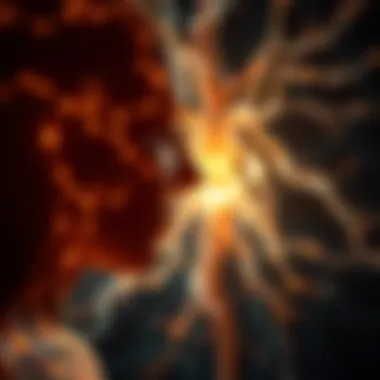
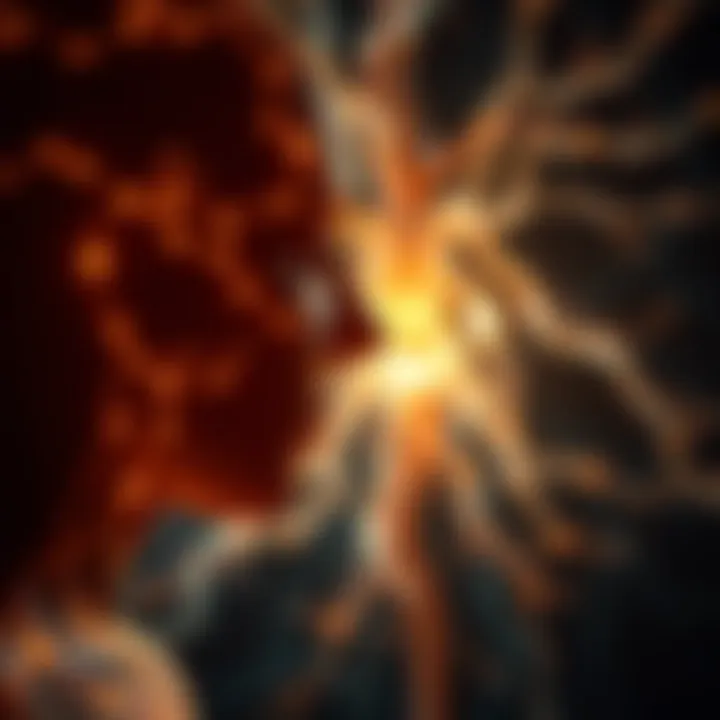
One of the distinguishing features of schizophrenia is its onset, often emerging in late adolescence or early adulthood, a critical time for personal development. The disorder magnifies issues surrounding communication, leading to challenges in maintaining social connections and vocational pursuits. Consequently, schizophrenia exemplifies the critical need for comprehensive mental health initiatives and tailored treatment strategies to mitigate its impacts.
Addressing disorders of the nervous system is essential not just for individual health but for societal understanding and response as well.
The exploration of these common disordes of the nervous system enlightens the intricate ties between neurological and psychiatric health, forming a critical focus on how to maintain overall well-being. For further understanding, additional resources like Mayo Clinic or NIH can provide in-depth insights and community support for those facing these challenges.
Nervous System Health and Maintenance
A well-functioning nervous system is like the conductor of an orchestra: it ensures that all sections play harmoniously together. In this context, maintaining the health of the nervous system is paramount for optimal bodily function, emotional balance, and cognitive clarity. The intricate web of neurons, pathways, and synapses plays a critical role in multiple aspects of personal well-being. When one experiences stress or health issues, the nervous system often bears the brunt, making proactive measures crucial.
Prioritizing nervous system health not only enhances physiological function but also contributes to mental wellness. This connection highlights the necessity of understanding the factors and interventions that can lead to better outcomes.
Lifestyle Factors
Nutrition
Nutrition stands out as a cornerstone of nervous system health. A well-balanced diet, rich in Omega-3 fatty acids, antioxidants, and vitamins, can bolster neuronal health and enhance neurotransmitter function. Foods such as fatty fish, walnuts, and leafy greens are not just good for the heart; they’re also vital for brain function.
The key characteristic of nutrition for nervous health is its ability to reduce inflammation and oxidative stress. This is noteworthy because inflammation has been linked to various neurological disorders. Learning to incorporate foods like blueberries and turmeric into your daily meals is a practical step toward supporting your brain.
However, while many view supplements as a quick fix, relying solely on them can sometimes lead to deficits elsewhere in one’s diet. A balanced, whole-food approach is always favored over pills and powders.
Physical Activity
Physical activity does more than just keep the body in shape; it has profound effects on the nervous system. Regular exercise stimulates the production of neurotransmitters like dopamine and serotonin, which are crucial for mood regulation. Activities like swimming, running, and even dancing can ignite the brain’s ability to form new connections, benefiting cognitive functions.
One key characteristic of physical activity is its ability to reduce stress and anxiety levels, making it a popular recommendation in maintaining mental wellness. Unique to physical activity is the immediate release of endorphins, which are natural mood lifters, that contribute to an overall feeling of euphoria after a workout. However, it’s important to note that over-exercising can lead to exhaustion and injuries, which could ultimately negate these benefits. Striking a balance is essential.
Therapeutic Interventions
Cognitive Behavioral Therapy
Cognitive Behavioral Therapy (CBT) has emerged as a vital tool in the therapeutic landscape for individuals struggling with anxious thoughts and behaviors. CBT gains attention for its structured approach to addressing dysfunctional thoughts and habits that impact nervous system health. By focusing on the connections between thoughts, feelings, and behaviors, it empowers individuals to change their mental framework.
A standout feature of CBT is its versatility; it can be tailored to various conditions, from anxiety disorders to depression. This adaptability makes it a popular choice for many mental health practitioners and patients alike. However, some people might find the structured nature of CBT challenging. It requires commitment and active participation, which might not suit everyone.
Mindfulness Practices
Mindfulness Practices play a significant role in calming the nervous system and fostering emotional resilience. Techniques such as meditation, deep breathing, and yoga can reduce stress responses and enhance mental clarity, creating a buffer against everyday pressures.
What makes mindfulness appealing is its accessibility; one doesn’t need specialized skills or tools to get started. Simply putting aside a few minutes each day for mindful breathing can yield significant benefits over time. Yet, the challenge lies in consistency. Many practitioners find it tough to maintain a mindfulness routine amidst the busyness of daily life.
Mindfulness is not about eliminating thoughts but instead about learning to manage them effectively.
End
The conclusion serves as a vital summation of the journey through the intricate world of the nervous system. It ties together the various threads woven throughout the article, emphasizing the interconnectedness of the central and peripheral systems, as well as their profound influence on health, behavior, and cognition. Understanding the nervous system is not merely an academic exercise; it is an essential part of recognizing the holistic nature of human health and wellness.
Summary of Key Points
In this exploration, we highlighted several essential points:
- The nervous system is divided into two primary components: the central nervous system (CNS) and the peripheral nervous system (PNS). Each plays a crucial role in processing information and coordinating responses throughout the body.
- The mechanisms of signal transmission, including nerve impulses and synaptic activity, underlie all neurological functions. Moreover, reflex actions and voluntary movements illustrate the system's efficiency in responding to external stimuli.
- Mental health is deeply rooted in the functionality of the nervous system. Cognitive functioning and emotional regulation are intrinsically linked with the health of our neural pathways. Stress and anxiety can ripple through this system, leading to disorders that affect not only mental well-being but physical health as well.
- Lifestyle choices, such as nutrition and physical activity, as well as therapeutic interventions like cognitive behavioral therapy and mindfulness, play a critical role in maintaining nervous system health.
Future Directions in Research
The continued exploration of the nervous system promises to yield fascinating insights. Key areas for future research include:
- Neuroplasticity: Understanding how the brain adapts and reorganizes itself could revolutionize treatment options for various neurological and psychiatric disorders.
- Gut-Brain Connection: Investigating how the gut microbiome influences brain function might lead to innovative strategies for enhancing mental health by targeting gut health.
- Technological Advances: The use of neuroimaging and biofeedback is expanding our comprehension of nervous system functions. This could improve diagnosis and treatment methodologies.
- Interventions and Therapies: We need to develop and refine therapeutic techniques that target specific neural pathways to address mental health issues directly.
By delving into these areas, we stand to gain better insights into the delicate balance of the nervous system in which our overall health and wellness depend. As scientists and healthcare professionals continue to unearth the mysteries of this complex system, the potential for improving mental health and quality of life becomes increasingly promising.
"To understand the intricacies of the nervous system is to unlock the potential of the human mind and body."
For more insights into these topics, you may visit Wikipedia, Britannica, or engage with communities on Reddit.
It is clear that prioritizing the health of the nervous system not only enhances individual well-being but reinforces the integral link between body and mind, leading to a more balanced and fulfilling life.















